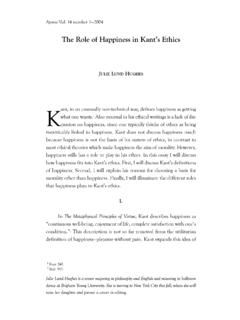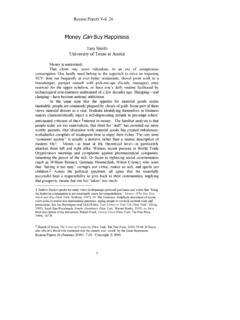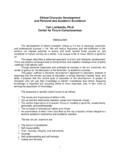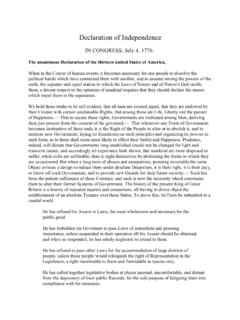Transcription of BUSINESS ETHICS :: Utilitarianism
1 1. BUSINESS ETHICS :: Utilitarianism Introduction Jeremy Bentham Theory of Utility Types of Utilitarianism Some Criticisms Moral Dilemma Introduction Over the course of the next two lectures we will be looking at two of the most politically and philosophically significant theories of modern times (1500- present), the consequentialist theory of Utilitarianism and the deontological theory devised by Immanuel Kant (often referred to as Kantianism). Today's session will focus on Utilitarianism and the next (on Tuesday, 4th October) will look at deontology. Utilitarianism is a normative ethical theory. It is the most well-known and prevalent forms of consequentialism.
2 Consequentialism is an umbrella term for a range of moral theories that state the rightness or wrongness of an action should be based solely on the results produced by that action. There have been many different forms of theory of a consequentialist nature throughout history. When modern Utilitarianism 's most influential exponent, Jeremy Bentham, set out his moral theory in 1789, it was not an unfamiliar concept. Jeremy Bentham Jeremy Bentham (1748-1832) was born in the 18th Century in London, into a family of prominent attorneys. At that time, England was experiencing a great deal of economic, political and social change. Many of the ideas/practices that had been considered the norm were no longer relevant.
3 Although Bentham studied law, following the family tradition, he never practiced preferring instead to study legal, social and moral institutions and write papers with proposals for reform. He published relatively few of the numerous manuscripts he wrote during his lifetime. His most important theoretical work was Introduction to the Principles of Morals and Legislation, which set out most of his moral theory. Bentham regularly attacked the main political parties in government but it was through his contacts in political life that many of his ideas for reform became a reality ( the Reform Bill of 1832, and the secret ballot). It appears that he had at least an indirect effect on British political life during his lifetime.
4 When Bentham died in 1832, he left countless pages (tens of thousands) of his writings and a large estate which funded the newly-founded University College, London (for non-conformists, Catholics, Jews and others who could not get into the established universities). He requested that his embalmed corpse be Lecture 2. Friday, 30th September 2005. 2. embalmed and placed in a glass cabinet in the university, and that is where he remains to this day. Psychological Hedonism and Psychological Egoism Much of Bentham's moral theory of utility is based on his concept of human nature. Central to this concept was his understanding of human behaviour as solely motivated by the pursuit of pleasure and the avoidance of pain.
5 Hedonism is a philosophical theory that views pleasure as the supreme good (or value) and pain as the ultimate evil. Psychological hedonism refers to the notion that human beings are naturally motivated by a desire for pleasure and an aversion to pain. Early in Introduction to the Principles of Morals and Legislation, Bentham states that [n]ature has placed mankind under the governance of two sovereign masters, pain and pleasure. It is from them alone to point out what we ought to do, as well as what we shall do (emphasis added). Using the word ought' here indicates that pleasure and pain are not merely motives for action but also define what is morally good and bad (pleasure being good and pain being bad).
6 Bentham also viewed human beings as essentially self-interested individuals. In fact, he believed that concepts such as community' and social relations' were useful social conventions but fundamentally meaningless. The individual is the only unit of society and no one individual is more or less important/valuable than another. Psychological egoism is the theory that one always acts in one's own best interests - even if one acts altruistically. When acting altruistically, psychological egoists believe that we are promoting our own happiness whether directly or indirectly. These two core concepts of human nature had a profound influence on the development of Bentham's theory of utility, as will become clear in the next section.
7 Theory of Utility Bentham's theory of utility is based on three central features: 1. The greatest happiness principle (or utility principle). 2. Egoism 3. Artificial identification of one's own interests with those of others The principle of utility states that what is right is that which promotes the greatest happiness . Utility here is not simply referring to the usefulness of actions but the extent to which an action promotes the good ( happiness ). Bentham's psychological hedonism accounts for his definition of good/ happiness as that which is most pleasurable. Hedonistic Utilitarianism interprets a variety of experiences as pleasure' and some more contemporary utilitarians are described as pluralists because they identify other intrinsic values besides pleasure' such as courage, honesty, friendship and knowledge.
8 The greatest Lecture 2. Friday, 30th September 2005. 3. happiness principle applies to every single action - an action which involves heroic sacrifice but fails to increase the general happiness is morally wrong. We have already looked at the idea of psychological egoism as stated by Bentham. It was clear that he believed we all ultimately aim to satisfy our own self-interests, altruism (unselfish regard for welfare of others) is impossible - if we act in the best interests of others it is because we will gain some personal satisfaction for doing so. In Bentham's view this is not a bad thing. The idea of psychological egoism may appear to rule out acting in the interests of others most of the time anyway.
9 In actual fact Bentham believed that the value of pleasure was so important that all human beings (egoists) would aim to maximise it even if it was the pleasure of others. The artificial identification of our own interests with others means that human beings will always act in such a way that promotes the general happiness as this benefits all people, if indirectly, in the long term. Types of Utilitarianism In recent times Utilitarianism has been sub-divided into a number of variant forms. Among these are act, rule, negative and preference Utilitarianism . Act Utilitariansim Act Utilitarianism is one of the simpler and more straight-forward types.
10 Act Utilitarianism advises us to judge each individual action on its outcome/results alone. If it is a choice between two courses of action we are morally obliged to take the one which yields the most happiness for the most people. The problem with this is that it could permit some intuitively wrong acts, such as employing 25 child labourers in China to make cheaper products for a jeans company in England, the profits for the thousands of shareholders in the company would be massively increased. Rule Utilitariansim Rule Utilitarianism attempts to resolve the moral loop hole' (illustrated above) in act Utilitarianism . Rule Utilitarianism is not concerned with assessing individual acts but the utility of a rule for action.







